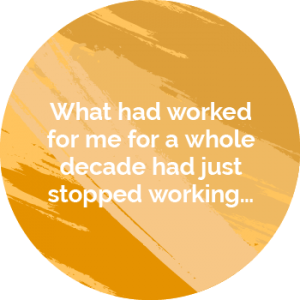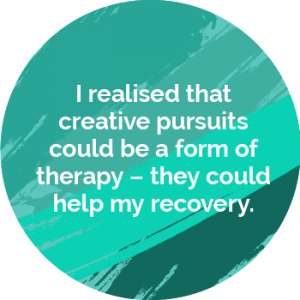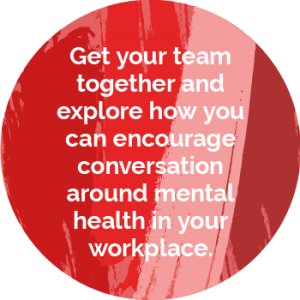After a decade spent climbing the career ladder to a senior comms role and the unrelenting stress and pressure that went hand-in-hand with her ascent, Jo Hooper found she just couldn’t continue as she was.
But it was reaching this dark place in her life that led her to find her creative light – and to start a new career in the process.
To mark Mental Health Awareness Week, Jo has kindly shared her story with us here.
This time last year, I wouldn’t have called myself a creative person. I am a very logical, linear thinker. (An ‘ESTJ’ if you’re a Myers Briggs devotee). I’m a detail person. Show me one of those fuzzy pictures where you’re supposed to see the face of a celebrity and I just see dots.
I left the true creative thinking to my team – my niche was strategy and influencing, but now I wonder if my health and the bounds of a corporate role stifled any creativity I had.
In fact, this time last year, I was two months into three months off work with anxiety and depression. I would probably have been alone (I spent a lot of time on my own), possibly listening to an audio book (my mind was racing with too many anxious thoughts to read words on a page), perhaps having a nap (I wasn’t sleeping through the night); and probably pondering how I would ever be ready to go back to work again.
At that point, I had been in comms for 10 years. I’d worked hard, progressed through the ranks quickly and had achieved my goal of reaching a Head of Comms role by the time I was 30. But what had worked for me for the previous decade had just stopped working
‘I can’t be here’
I think in reality I had been ill for a long time. The years of long hours, high stress, putting impossible amounts of pressure on myself and laser focus on my career had led me to a bad place. I had become so paralysed by anxiety and fear of failure (my mind’s constant mantra), that I wasn’t able to turn on my work phone. Couldn’t contemplate reading or responding to an email. Heart racing at the thought of having to make a decision or even have a conversation with someone.
I found a HR contact, told her repeatedly ‘I can’t be here’ and went home. I didn’t go back for more than three months.
During those three months I did a lot of work to understand myself. I started seeing my third therapist (top tip here – if you don’t click with your first or even your second therapist, say goodbye and find someone else – it’s an intensely personal relationship and just won’t work if it’s the wrong person for you), started listening to all the audiobooks and podcasts about anxiety, depression and how the brain functions under stress, that I could.
I started to come down from the high of anxiety and I gradually found things that made me happy and gave me a sense of achievement outside work – something I hadn’t felt for a very long time.
Uncovering (hitherto hidden!) creativity
During that time, someone bought me a colouring book and some pencils. I sat down one day, started colouring and something magic happened. My mind was quiet. I was enjoying the feeling of concentration. I felt……creative.
OK, I was expressing creativity within literal drawn boundaries, but this was new to me. 
I realised that creative pursuits could be a form of therapy – could help my recovery. I started spending time in galleries and museums – initially for the quiet atmosphere, but I discovered a new love for visual art. I continued with my colouring (like a child) and started journalling. Creative writing became an outlet for me and a way of making sense of how I was feeling.
Fast forward a year and I now run my own business – mad and sad club – to take what I’ve experienced over the last two years and help organisations understand what they can do about mental health at work.
And do you know what I’ve realised? Now that I’m unfettered by the boundaries of a corporate job, not hemmed in by the needs of another organisation, I am pretty bloody creative!
I love writing for my site and others and have developed a clear voice and purpose to my writing. I enjoy designing worksheets and resources to help IC pros think about how to tackle mental health at work, and I spend many an afternoon pondering what service, product or idea could help tackle a new issue I’ve come across (I’m definitely more creative in the afternoon – another new discovery).
I love running my own business. That certainly wouldn’t have come about if I hadn’t been knocked sideways by my mad mind and I genuinely don’t think I would have been able to open the door in my brain to this new creativity either.
Get creative this Mental Health Awareness Week
I’d like to leave you with something simple that you can do with your team this Mental Health Awareness Week.
Talk.
You don’t need to be afraid of having a conversation with someone about their mental health. It was a simple, human statement, said by someone who wasn’t clinically trained, that had a huge effect on me. That person said: “I don’t think you’re very well.” I wasn’t. And I had no idea. 
Get your team together and explore how you can encourage conversation around mental health in your workplace. I would suggest starting with some words to get you thinking.
Prompts like: be human; be brave; be kind.
Could you come up with a piece of content, the start of a campaign to get people thinking about their own and others’ mental health this week?
And thinking about you, if you are worried about someone (maybe you’ve seen them start to act differently, or you’ve seen them struggle with tasks or situations they wouldn’t normally), then ask the question – are you OK?
If they protest, push them – ask if they’re sure. If you know them well and you’re pretty sure they’ve been acting differently, you could go one step further and tell them “I don’t think you’re very well.” It might be just the push they need to realise it and start to get better.
I think you’ll be surprised at the conversation that will open up and the positive impact you can have.
Guest blog by Jo Hooper, founder of mad and sad club for Alive!
If you’re struggling with any of the issues mentioned here, then please remember you’re not alone. There’s loads of support and advice available, so never feel afraid to seek help. A great place to start is by using the support you might have at work – EAP schemes are great and often will give you access to counselling or therapy quickly. If you have private healthcare, use it – don’t be afraid to call them. Seeing your GP can also help, particularly with medication or take a look at the NHS website mood zone.
In times of crisis the Samaritans are always just a phone call away (call free anytime night or day on 116 123) as well as newly established Shout – a text line for those who are struggling.
















